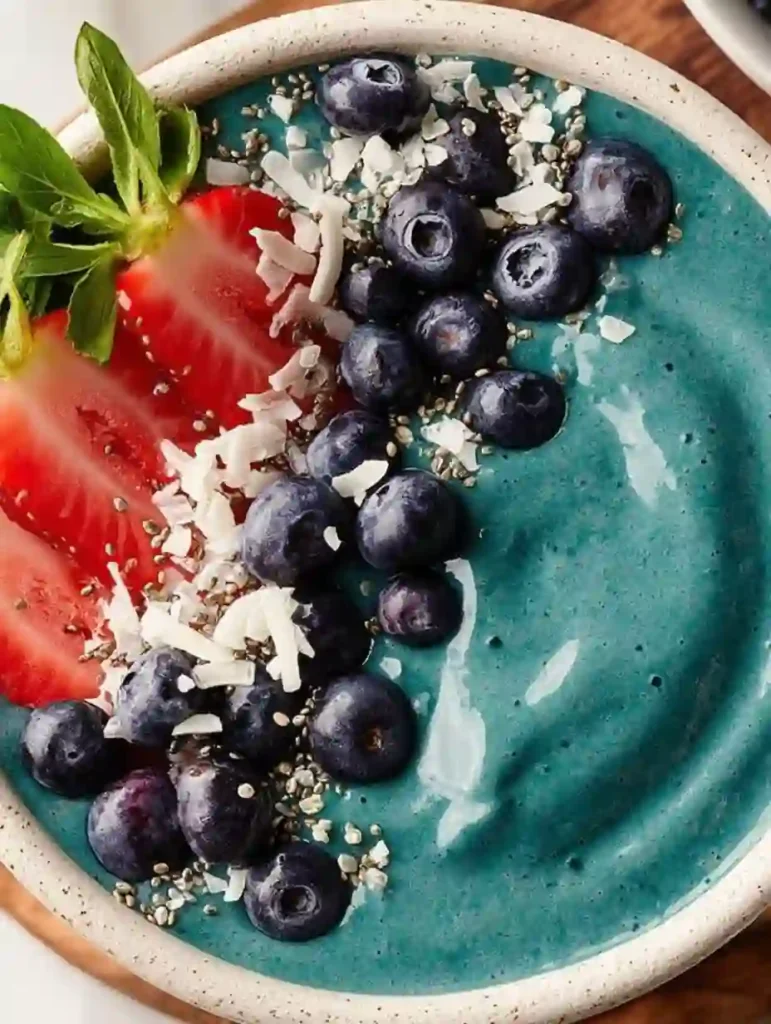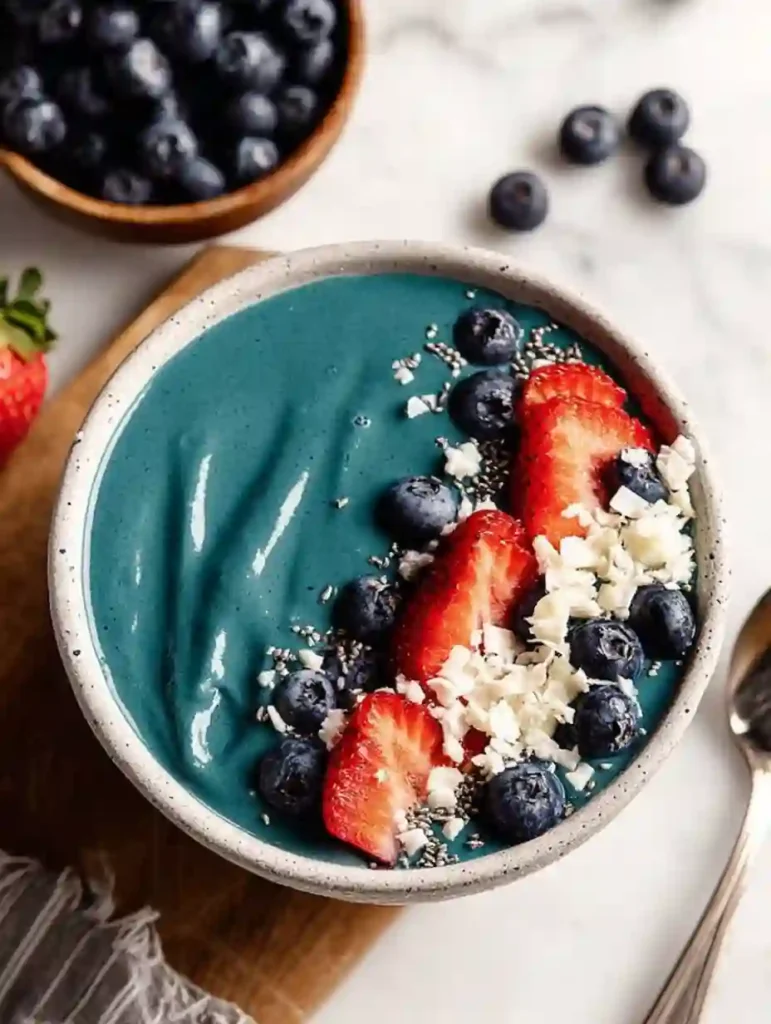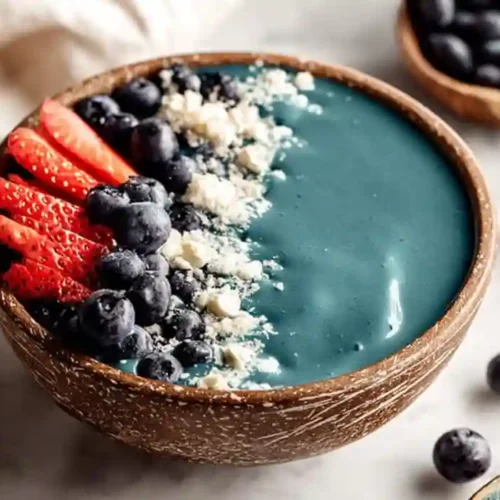Blue spirulina smoothie lovers, you are in the right kitchen. Those bright café swirls look magical, yet most home versions fall flat or turn swamp green. I blended, tweaked, and taste-tested until my spoon hit perfection. This quick guide covers cloud effects, bowl thickness, and banana-free hacks so you can sip a sky-blue masterpiece without guesswork.
Why You’ll Love This Recipe
- Ready in five minutes, so weekday breakfast chaos turns into chill blue bliss.
- Only pantry staples plus a pinch of blue spirulina for café-level color without hidden sugars.
- Cloud technique paints yogurt swirls that impress guests and Instagram alike, no barista skills required.
- Balanced tropical flavor hides the greens, making picky kids and veggie-averse adults ask for seconds.
- Flexible base lets you swap banana, boost protein, or thicken for a spoonable bowl.
Ingredients Needed

For the creamy base
- 1 ripe banana, sliced and frozen overnight or 1 cup frozen cauliflower for a lighter twist
- ½ cup yogurt of your choice; coconut yogurt brings a zesty tang, whereas Greek yogurt boosts the protein hit
- ½ cup frozen mango or your favorite frozen fruit for natural sweetness and a tropical vibe
For fresh crunch
- ¼ to ½ English cucumber, peeled for a smoother sip
For the splash
- 1 cup liquid: almond, oat, soy, or coconut milk all work great; pick soy if you want extra protein
For that electric blue color
- 1 to 2 teaspoons blue spirulina powder
Optional boosters
- 1 handful of baby spinach; the blend shifts to a bright aqua green instead of brown
- 1 Medjool date if you crave dessert-level sweetness
Notes & Substitutions
- Banana alternative: Frozen avocado delivers the same velvety mouthfeel while reducing carbs.
- Yogurt choices: Dairy-free coconut yogurt keeps it vegan; kefir adds probiotics and a gentle tang.
- Liquid alternatives: Use coconut water for a hydrating, lighter drink.
- Greens tip: Spinach keeps flavor neutral; kale adds earthiness and thickens the blend.
- Sweetness control: Taste before blending in the date; fruit ripeness can make extra sugar pointless.
How to Make a Blue Spirulina Smoothie

- Chill your gear (optional but worth it)
Pop your serving glass in the freezer for five minutes while you gather ingredients. A frosty glass slows melting and keeps that blue hue vibrant. - Load the blender in smart layers
- Pour your chosen liquid into the blender first. This lets blades spin freely from the start.
- Sprinkle in the blue spirulina powder so it dissolves evenly instead of streaking later.
- Add greens next if you are using them. Their weight helps pull powder down into the liquid.
- Finish with frozen fruit, yogurt, and any extras. Heaviest items on top stop powders from clumping under the blades.
- Pour your chosen liquid into the blender first. This lets blades spin freely from the start.
- Start slow, finish strong
Turn the blender to its lowest speed for ten seconds to pull everything toward the blades. Boost the speed to high for about a minute, blending until the smoothie turns glossy and a steady vortex spins up to the lid. Drop back to low for five seconds to pop any trapped air bubbles. This three-speed ramp prevents over-working the motor and gives the smoothest texture. - Check thickness and adjust
Too thick? Add a splash of milk and pulse three times. Too thin? Drop in a handful of extra frozen mango cubes and pulse for another 15 seconds. You want the stream to fall from a spoon in smooth ribbons without splattering. - Create the “cloud” effect (optional show-stopper)
Drag a spoonful of ultra-thick coconut yogurt around the inner walls of your chilled glass. The yogurt sticks to the cold surface and forms dreamy white streaks once the blue smoothie pours in. - Serve immediately
Pour the smoothie into your chilled glass or bowl, pile on toppings if you like, and dive in. The color fades after 20 minutes as the ice melts, so snap that photo fast.
Mini-tips inside the steps
- Frozen fruit sweetens naturally, so taste before you reach for honey.
- If you hear a high-pitched whine while blending, stop and push ingredients toward the blades with the tamper. Sound cues often beat timer cues.
Pro Tips & Troubleshooting

Expert Tips
- Arrange fruit chunks in a single layer on a baking sheet to freeze, then transfer them to a bag. The pieces stay loose so the blender can grab them easily. Quick-freeze the fruit just like the USDA Freezing and Food Safety guide recommends for peak texture and safe storage.
- Pulse before you blend. A few quick bursts chop big pieces and spare your motor.
- Add zest for depth. Grate a pinch of fresh lime zest into the jar; the citrus lifts the tropical notes and makes the blue pop.
- Use a silicone spatula to scrape every drop. You paid good money for that spirulina; don’t leave any behind.
- Flash-chill toppings. Coconut flakes and cacao nibs stay crunchy and instantly cool the smoothie when sprinkled on top.
For storage times on everything from mango to yogurt, see the FoodSafety.gov Cold Food Storage Chart.
Common Mistakes to Avoid
- Skipping liquid measurement. Eyeballing often leads to sludge or soup. Measure the cup for predictable thickness.
- Blending for too long heats the mixture and dulls the color. Follow the slow-high-low pattern.
- Pouring powder on top. Spirulina sitting on fruit clumps fast. Always add it right after the liquid.
- Ignoring blade sounds. A high-pitched squeal means air pockets. Stop, tamp, and relaunch instead of forcing the motor.
Creative Shortcut
Craving a parfait vibe? Spoon alternating layers of smoothie and granola into a cleaned jam jar and chill it in the freezer for ten minutes. The quick set firms the layers and gives you a grab-and-go breakfast that looks like it came from a fancy café. Who said smoothie art takes all morning?
Serving, Storage & Variations
Fun ways to serve
- Cloud glass: Swirl a coat of thick coconut yogurt around a frosted glass, then pour in the smoothie so airy white ribbons appear.
- Tropical bowl: Blend with half the usual liquid for a spoon-ready texture. Top with kiwi slices, toasted coconut, and a drizzle of honey.
- Party pops: Pour leftovers into ice-pop molds, freeze four hours, and hand out sky-blue popsicles on hot afternoons.
- Layered parfait: Alternate smoothie and granola in a clear jar, add fresh berries on top, and stash it in the fridge overnight for grab-and-go breakfast bliss.
Storage tips
- Fridge: Store extra smoothie in an airtight jar up to 24 hours. Give it a quick shake before sipping because pigments can settle.
- Freezer: Freeze portions in silicone ice-cube trays. Drop the cubes into a blender with a splash of milk for a two-minute “fresh” smoothie whenever cravings hit. Need to thaw? Follow the USDA Safe Defrosting Methods for fastest, food-safe results.
- Avoid reheating: Warm temperatures dull the vivid color and some nutrients, so enjoy this blend chilled.
Quick variations to keep things interesting
| Variation | Swap or Add | Result |
| Vegan protein boost | Replace yogurt with silken tofu and add a scoop of plant protein powder | Extra creamy texture plus 10 g more protein |
| Green power | Blend in a handful of baby spinach and use coconut water instead of milk | Light, hydrating sip with bonus iron and vitamin C |
| Spice it up | Add a dash of ground ginger along with a squeeze of lime | Bright, zesty flavor that perks up sleepy taste buds |
| Chocolate treat | Stir in a tablespoon of cacao powder, then scatter cacao nibs on top | Rich dessert vibe without any refined sugar |
If you need vegan or gluten-free pointers, check the FAQ section below where we dive into common swaps and concerns. Feel free to invent your own remix and share it in the comments. I once tossed in leftover roasted beet cubes for a funky purple streak that wowed my niece; turns out kids love psychedelic smoothies!
Nutritional Information
| Nutrient | Per Serving* |
| Calories | 383 kcal |
| Carbohydrates | 57 g |
| Protein | 23 g |
| Fat | 9 g |
| Saturated Fat | 5 g |
| Polyunsaturated Fat | 0.4 g |
| Monounsaturated Fat | 2 g |
| Trans Fat | 0.01 g |
| Cholesterol | 34 mg |
| Sodium | 162 mg |
| Potassium | 1 218 mg |
| Fiber | 5 g |
| Sugar | 42 g |
| Vitamin A | 1 446 IU |
| Vitamin C | 42 mg |
| Calcium | 438 mg |
| Iron | 2 mg |
Numbers reflect one smoothie made with banana, Greek yogurt, and almond milk. Swapping ingredients, such as using cauliflower or tofu, will shift the figures.
All nutrient values come from USDA FoodData Central entries for banana, mango, and plain yogurt.
Why it matters
Protein from the yogurt helps muscle repair, while banana and mango deliver quick energy from natural carbs. Blue spirulina contributes antioxidants, and almond milk adds calcium with minimal fat. The drink also packs potassium for fluid balance.
If you tweak the ingredients or portion size, verify the numbers with a nutrition calculator such as Cronometer or MyFitnessPal.
___________________________________

Blue Spirulina Smoothie Recipe
Equipment
- Blender
Ingredients
Creamy Base
- 1 cup frozen banana or cauliflower for creaminess and banana-free option
- 0.5 cup yogurt Greek or coconut
- 0.5 cup frozen mango or other fruit for sweetness
Fresh Crunch
- 0.25 English cucumber peeled
Liquid Base
- 1 cup plant-based milk almond, soy, oat, or coconut
Color and Boosters
- 1 tsp blue spirulina powder up to 2 tsp for deeper color
- 1 handful of baby spinach optional, for added nutrients
- 1 Medjool date optional, for sweetness
Instructions
- Chill your serving glass in the freezer for five minutes to preserve the smoothie color.
- Layer the blender: start with milk, then blue spirulina, then greens, followed by frozen fruit and yogurt.
- Blend on low for 10 seconds, then on high for 1 minute until smooth, then back to low for 5 seconds.
- Check thickness. Adjust with more milk if too thick, or frozen fruit if too thin.
- Optional: Create “cloud” effect by dragging thick coconut yogurt on inside of glass before pouring smoothie.
- Serve immediately. Enjoy as a smoothie, bowl, or parfait.
Video
Notes
Nutrition
Explore More Delicious Recipes
If you enjoyed diving into the Blue Spirulina Smoothie, why not explore more delightful drinks from our collection? Here are two must-try recipes to elevate your sipping adventures:
Explore these recipes today to bring more exciting flavors to your table and make every meal memorable!
Conclusion
A blue spirulina smoothie shows that you can drink both vibrant color and nutrition from a single cup. Five minutes is all it takes to enjoy café-worthy cloud swirls, sunny tropical taste, and a hefty hit of protein and antioxidants. Your blender handles the heavy lifting; you just pour and smile.
If this blend made your morning better, leave a comment and tap the stars below; your feedback helps fellow smoothie fans find the perfect blend.
Share a snap on Instagram or Pinterest and tag me so I can cheer your creation. Curious minds want to know: Did you go cloud glass, bowl, or popsicle? Let us know in the comments and keep the blue wave rolling.
Frequently Asked Questions
1. What does blue spirulina taste like in smoothies?
Blue spirulina has almost no flavor. You taste the fruit, yogurt, and other mix-ins, not the algae.
2. Is blue spirulina actually good for you?
Yes. The pigment phycocyanin acts as a strong antioxidant, and studies link it to lower inflammation and better immune support.
Research on its key pigment, phycocyanin, shows potent antioxidant and anti-inflammatory effects (see this open-access review on NCBI).
3. Why is blue spirulina so expensive?
Manufacturers extract only the blue pigment from regular spirulina. The extra processing, low yields, and strict quality controls drive up the price.
4. Where to buy blue spirulina for smoothies?
Check health-food stores, some larger groceries like Whole Foods, or online retailers such as Amazon and iHerb. Look for third-party purity testing on the label.
5. What is the downside of spirulina?
Poor-quality spirulina can contain heavy-metal contaminants. Always pick brands that show lab results and avoid products with “proprietary blend” wording.
6. Who should not use blue spirulina?
People with phenylketonuria or severe seafood allergies should talk to a doctor first. Pregnant or breastfeeding individuals should also seek medical advice before adding it to their diet.
7. Can you eat blue spirulina every day?
Most healthy adults can enjoy one to two teaspoons daily without issues. Rotate other superfoods into your routine to keep nutrition balanced.
Have another question? Share your question in the comments section, and we might include it here!













